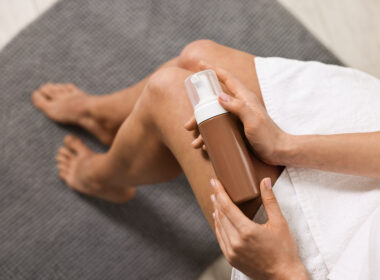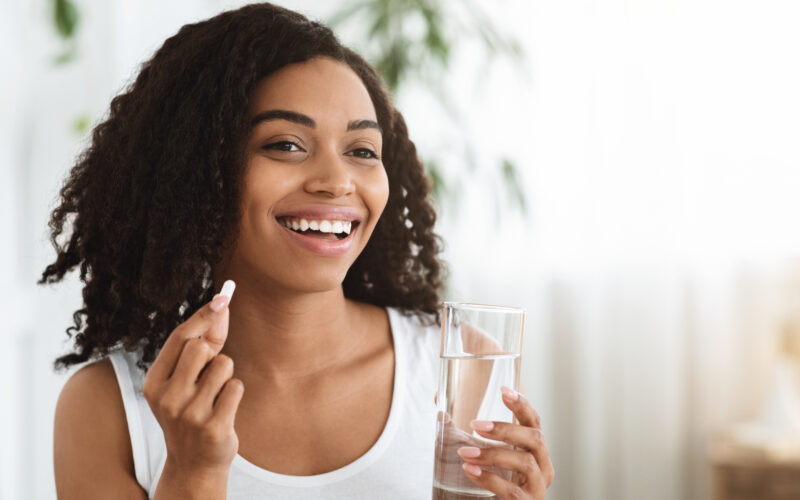Boron, a trace element found in many plant foods or taken as a supplement, is gaining popularity as a preventive against osteoporosis in menopausal women. Osteoporosis makes bones weaker and more brittle and thus more likely to break, and it’s connected to low estrogen levels, as occur naturally during menopause.
We have previously written about the importance of ovulatory cycles for bone health, especially during the crucial bone formation years of women’s 20s and earlier. Since women on hormonal birth control (HBC) are at risk of bone density loss, should boron be recommended for these women as well? Let’s look at what research has to say on the uses of boron and whether it might make sense for HBC users to take.
Uses of boron: anti-inflammatory properties
According to the National Institute of Health (NIH), boron has anti-inflammatory properties. This randomized clinical trial noted that due to its anti-inflammatory properties, boron could even be used to reduce menstrual cramps [1]. Other research (summarized here) found that boron supplementation reduced symptoms of osteoarthritis, a condition characterized by inflammation.
Uses of boron: cancer prevention
While no research has directly studied whether boron supplementation might prevent or treat cancer, some research (summarized here) correlates higher food consumption of boron with lower likelihood of prostate cancer for men and both lung and cervical cancer for women. That is, those who consumed the most boron in their diets were the least likely to have those kinds of cancer.
Uses of boron: osteoporosis prevention in menopausal women
As women undergo “the change” in menopause and postmenopause, they lose the myriad of benefits of regular ovulation. One significant side effect is a decrease in bone density, leaving them at risk for osteoporosis. According to this narrative review, studies of postmenopausal women consistently show bone health-boosting effects from adding boron into your diet/supplementation routine [2].
Boron is recommended for menopausal women because it positively affects calcium, vitamin D, and estrogen levels, which all contribute to bone health. Women supplemented with boron also have measurably higher levels of estradiol and calcium, similar to the effects of estrogen therapy [2][3]. Boron also helps Vitamin D utilization by extending its half-life. In animal studies conducted in 2008 and 2009, rats who were deficient in boron experienced impaired bone healing [4][5].
According to research on peri- and postmenopausal women, boron supplementation leads women to excrete out less calcium and magnesium in their urine, leading to higher levels of both in the body [2]. In 1985, the US Department of Agriculture (USDA) ran an experiment on postmenopausal women, looking at how boron specifically affected calcium [6]. They found that women who supplemented with 3 mg/d of boron daily excreted 44% less calcium in their urine.
Uses of boron: supplementation for women on HBC?
Women in menopause and post-menopause are more likely to require supplementation for bone health because of the loss of ovarian function. Our cycles—including the rise and fall of both estrogen and progesterone—play a vital role in bone development. Similarly, women with a history of hormonal birth control (HBC) use are at risk for decreased bone density (which may predispose them to osteoporosis later in life). This is especially true for those who used it as teens and into early adulthood, since these are critical periods in bone development [7][8]. Because the synthetic hormones used in HBC suppress the woman’s own estrogen and progesterone, women on the pill miss out on the bone-boosting benefits of regular ovulation.
This leads us to wonder, should women who do or have used HBC also be advised to supplement with boron? According to medical writer and author of Your Bones: How You Can Prevent Osteoporosis and Have Strong Bones for Life―Naturally Lara Pizzorno, there is “an absence of studies showing harm in conjunction with the substantial number of articles showing benefits (that) support the consideration of boron supplementation of 3 mg/d for any individual… who is at risk for or has osteopenia; osteoporosis; osteoarthritis (OA); or breast, prostate, or lung cancer.” With this information in mind, women with a history of HBC use could consider boron supplementation to aid in osteoporosis prevention.
How to supplement with boron
Boron is a naturally occurring element found most frequently in foods and drinks such as coffee, milk, apples, beans, and potatoes. However, it is worth noting that boron concentration can vary depending on where the foods were grown. Because of this, those wanting to increase their daily intake of boron may want to consider supplementation. There is no set recommendation for boron supplementation, but there is an established limit of no more than 20 mg daily for ages 19 and older. Supplementing with at least 3 mg of boron per day may support bone health and mineral density.
The bottom line on who could take boron
Boron is a naturally occurring element in our diets that potentially has multiple health benefits without major side effects. Most significantly, boron may help with bone formation and health, especially in those at risk for osteoporosis. Boron supplementation is recommended for menopausal and postmenopausal women, but it is worth considering whether it should be recommended for women who currently use or previously used HBC as well.
Additional Reading:
A guide to trace minerals for preconception, pregnancy, and postpartum health
References:
[1] Nikkhah S, Dolatian M, Naghii MR, Zaeri F, Taheri SM. Effects of boron supplementation on the severity and duration of pain in primary dysmenorrhea. Complement Ther Clin Pract. 2015 May;21(2):79-83. doi: 10.1016/j.ctcp.2015.03.005. Epub 2015 Apr 4. PMID: 25906949. [2] Rondanelli M, Faliva MA, Peroni G, Infantino V, Gasparri C, Iannello G, Perna S, Riva A, Petrangolini G, Tartara A. Pivotal role of boron supplementation on bone health: A narrative review. J Trace Elem Med Biol. 2020 Dec;62:126577. doi: 10.1016/j.jtemb.2020.126577. Epub 2020 Jun 6. PMID: 32540741. [3] Nielsen FH, Hunt CD, Mullen LM, Hunt JR. Effect of dietary boron on mineral, estrogen, and testosterone metabolism in postmenopausal women. FASEB J. 1987 Nov;1(5):394-7. PMID: 3678698. [4] Gorustovich AA, Steimetz T, Nielsen FH, Guglielmotti MB. A histomorphometric study of alveolar bone modelling and remodelling in mice fed a boron-deficient diet. Arch Oral Biol. 2008 Jul;53(7):677-82. doi: 10.1016/j.archoralbio.2008.01.011. Epub 2008 Mar 3. PMID: 18313642. [5] Nielsen FH, Stoecker BJ. Boron and fish oil have different beneficial effects on strength and trabecular microarchitecture of bone. J Trace Elem Med Biol. 2009;23(3):195-203. doi: 10.1016/j.jtemb.2009.03.003. Epub 2009 May 8. PMID: 19486829. [6] Pizzorno L. Nothing Boring About Boron. Integr Med (Encinitas). 2015 Aug;14(4):35-48. PMID: 26770156; PMCID: PMC4712861. [7] Prior JC. HOW CAN WE PROTECT PEAK BONE MASS AND FUTURE BONE HEALTH FOR ADOLESCENT WOMEN? – BY SUPPORTING OVULATION AND AVOIDING COMBINED HORMONAL CONTRACEPTION USE. Rev Paul Pediatr. 2017 Apr-Jun;35(2):121-124. doi: 10.1590/1984-0462/;2017;35;2;00019. PMID: 28977329; PMCID: PMC5496723.
[8] Delia Scholes, Rebecca A. Hubbard, Laura E. Ichikawa, et al. Oral Contraceptive Use and Bone Density Change in Adolescent and Young Adult Women: A Prospective Study of Age, Hormone Dose, and Discontinuation, The Journal of Clinical Endocrinology & Metabolism, Volume 96, Issue 9, 1 September 2011, Pages E1380–E1387, https://doi.org/10.1210/jc.2010-3027







